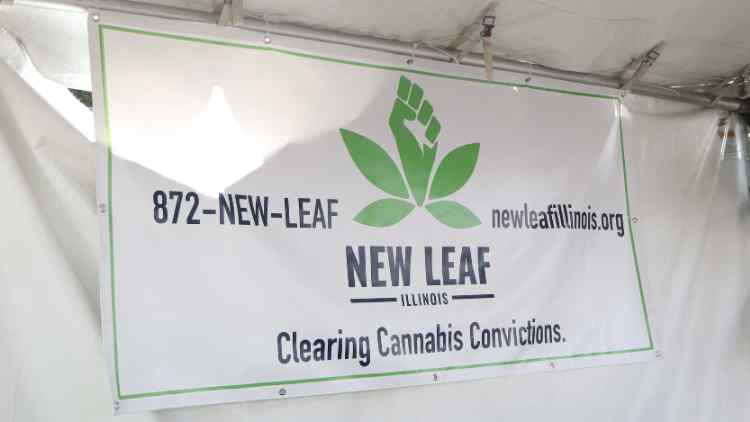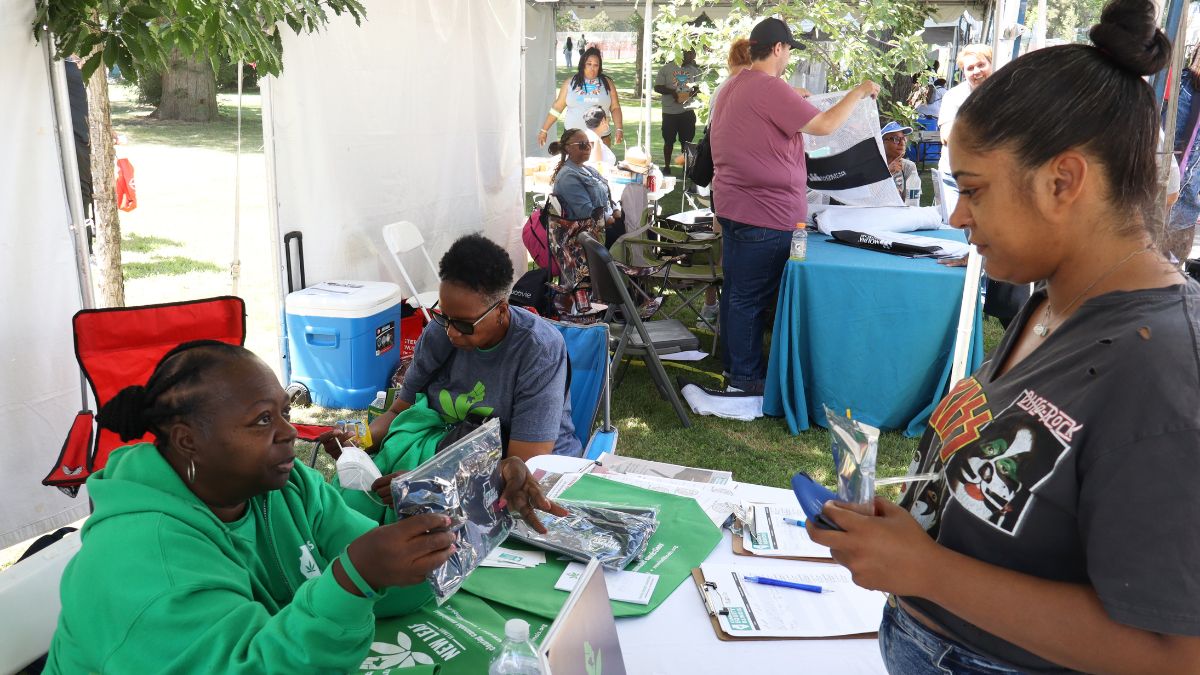Active in community events like the Bud Billiken Parade, New Leaf Illinois aims to provide a fresh start for those affected by past convictions (Photo Credit: Ethan Davis).
By Ethan Davis
On July 10, during National Hemp Month, Gov. JB Pritzker’s office announced that the Illinois cannabis industry had achieved $1 billion in retail sales.
Gov. Pritzker said Illinois has ‘the most equitable cannabis industry in the country.” Still, cannabis-related offenses are affecting people, with around 80,000 cases related to marijuana that are eligible for expunging.
New Leaf Illinois’ Mission and Achievements
Started in 2020, New Leaf Illinois aims to help people get specific cannabis records expunged for mostly minor cannabis offenses. It comprises 15 organizations bound together by this purpose.
According to a New Leaf Illinois spokesperson, the organization has opened more than 4,000 cases to help expunge them, with around 80,000 still available.
New Leaf Illinois was present at the Bud Billiken Parade and Festival at Washington Park last Saturday (Aug. 10). At their booth, they handed out free gear and asked attendees to submit their contact information to register for New Leaf Illinois services and talk to a lawyer affiliated with the organization.
“It’s a natural fit for New Leaf Illinois to participate in Bud Billiken, given the parade’s focus on empowerment. By helping people clear cannabis convictions and other past charges off their record, New Leaf Illinois empowers people to get a fresh start in their lives,” Beth Johnson, Illinois Equal Justice Foundation’s program manager for New Leaf Illinois, said in a statement.
The Cannabis Regulation and Tax Act’s Impact
This came after the Cannabis Regulation and Tax Act, signed in June 2019. The law not only legalized cannabis use but opened the door to pardoning around 11,000 cannabis convictions.
However, not all the convictions were vacated. Tens of thousands of records remain. When the expungement law was first announced, several outlets reported that around 800,000 cases were declared eligible (New Leaf Illinois says that currently, around 80,000 are eligible). Law enforcement agencies also vacated records, but some were still on file.
Challenges with Automatic Expungement
Johnson expanded on this in an interview.
“The issue with the automatic expungement of law enforcement records is that every time a person’s arrested and charged in court,” said Johnson, “Even if the case is dismissed, there’s still a public court record.”
“The automatic expungement that was undergone by these law enforcement agencies did not address the court records.”
When someone undergoes a background check, court records are still visible. These documents can impact people who apply for loans, jobs, housing and more.
Rather than automatic expungement, a person still needs to file to get their cases looked at.
You can do that by calling the New Leaf Illinois number or filling out a form on newleafillinois.org.
Legal professionals review the case and contact the applicant within 1-2 days. If the applicant is eligible, New Leaf Illinois will connect them with organizations that provide free legal representation to expunge those records.
Even if a person isn’t eligible, New Leaf Illinois will still direct them to other legal services to help them. It doesn’t hurt just to check. This is only the beginning of the process, but it is a worthwhile effort that can help change somebody’s life.
Addressing Historical Inequities

Photo Credit: Ethan Davis
As Johnson mentioned, it is no secret that cannabis offenses have primarily targeted low-income Black and Brown people, and the road to expungement of these records leads to more equity in the cannabis industry space.
A study conducted by the Cannabis Regulation Oversight Office from 2020-2023 found that 59% of all cannabis retail licenses went to either minorities or women. Still, cannabis records are hurting people, and government officials are being updated about solutions.
“Each year, we update every state legislator with the New Leaf information,” said Johnson. “I mean, it is them voting on a budget that allows for these appropriations, sending them resources to have available in their district offices for constituents that may benefit from this service. Because again, the goal is statewide access to legal services.”
Ongoing Outreach Efforts
The Bud Billiken Parade Festival isn’t the only social event New Leaf Illinois participates in.
New Leaf Illinois does various outreach efforts to advertise its services to the people of Illinois, and especially Chicago. Radio, CTA buses and Facebook ads have spread throughout the state to inform people about the possibility of expungement. They do presentations and social media and also show up at various community events, like the 2024 Juneteenth Village Fest.
“When there is something that is legalized, it is something we used to criminalize,” Johnson said. “We might as well be able to address and remove any barriers people face as a result; it would provide more opportunities not to have those records show in background checks.”
For more information on New Leaf Illinois or its expungement services, call 872-NEW-LEAF or visit newleafillinois.org.



